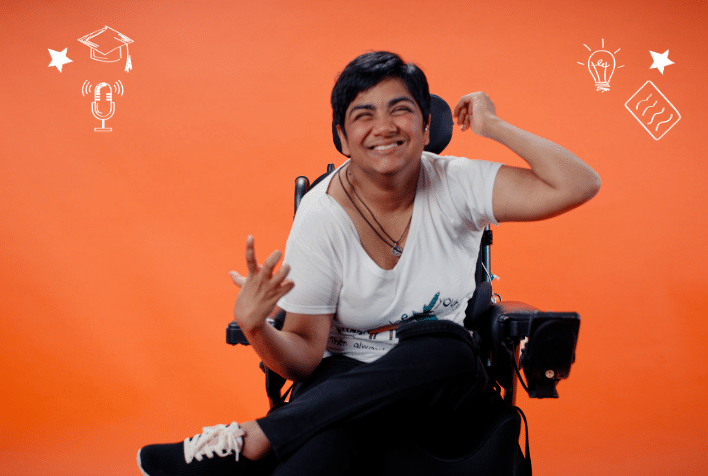
Marusha was diagnosed with cerebral palsy at three years of age, she has Dyskinetic, Quadriplegia and is a GMFC5. She can’t walk or move unassisted and needs help with all her physical needs. In her early years Marusha attended CPA for therapy and equipment.
Usually at GMFC level 5 many people don’t talk, but Marusha is the exception. She didn’t talk until she was 7 years old, but she says her voice is her greatest strength and she doesn’t know where she’d be without it today.
Marusha would like people to stop making assumptions that everyone who has cerebral palsy or can’t talk is intellectually disabled. When she was in primary school the teacher assumed she couldn’t spell her name but it was because she couldn’t use the computer she was given. She said she just put in any letters and the teacher let her play in the dolls corner. Marusha commented:
“People need to think outside the square. I’d like people with disabilities to be treated with greater respect, and not spoken to like children, even if they do have an intellectual disability. “
According to Jenny, Marusha’s mum, getting a CP diagnosis is part of the problem. Jenny speaks from personal experience, having fostered 40+ babies, at least 5 of which have been diagnosed with CP.
“It’s great that there are Early Diagnosis Clinics in hospitals and regional centres now. Everyone needs to know about early signs of CP. In my experience, many parents have the instinct that something’s wrong but many don’t want to believe it and don’t seek help early. They don’t realise that early intervention has a much better outcome for their child.”
Jenny suspected from seeing a photo of Marusha at 5 months old while still in India that there was something wrong, yet she wasn’t diagnosed with CP until 3 years old before she came under Jenny’s care. Jenny, being a family friend of Marusha’s adoptive parents, pushed for diagnosis. Jenny’s advice to parents is:
“Trust your instinct, seek help, get an opinion, get a second opinion if necessary. Don’t wait and see how you go, because early diagnosis is so important to get the intervention your child needs for optimal outcomes.”
Marusha names her mum as her inspiration, and she embodies Jenny philosophy to: “take every opportunity you are given because you never know where it’s going to lead.”
Marusha firmly believes that “You can be anything you want no matter what your ability.”
And she has definitely lived by that and grabbed all opportunities with both hands. At 27 years old, she’s has already achieved so much as an advocate for people with disabilities and children in out-of-home care, two causes she’s passionate about.
Marusha’s advice for parents of children diagnosed with CP is:
“Don’t give up. You never know what they can do if they try hard enough.
And take every opportunity no matter if you are disabled or not.”
Although she went to mainstream school from second grade, and had a teacher’s aide, it was difficult to make friends and she wishes she’d had more independence. In year 11 she started Social Inc in her high school, a program that promotes inclusion between mainstream students and students with disabilities. This awakened her passion for advocacy.
Marusha became one of the first people with a severe disability to complete the Duke of Edinburgh gold award, and advised on improving the program’s accessibility. She’s also worked for the Create Foundation, and was chosen as one of 15 around the world to work for the U.N on the rights of children in care. Marusha and Jenny also support an orphanage in India where there are 10 girls with various forms of CP. She has also worked with the Australian Coalition of Inclusive Education (ACIE) working on the Disability Standards Document and with CYDA.
Marusha currently volunteers with CPActive, CPA’s advocacy community, campaigning for more inclusion in schools. Marusha explains how important this as she’s been fighting the school system for inclusion for years, and still is.
After winning a scholarship to Deakin University, Marusha is currently studying English Literature, Sociology, and, hopefully, Law in the future. She’s hoping this will lead to a career in research.
Keen to find out more about cerebral palsy? Head to the “What is cerebral palsy” web page for more information and to watch the video explainer series.